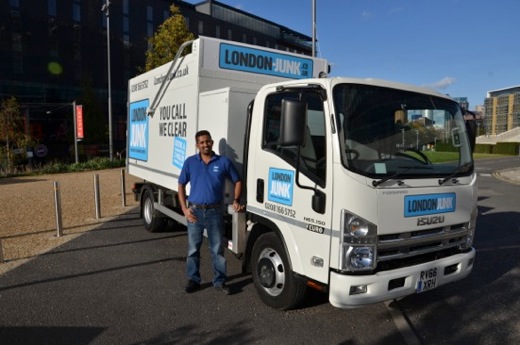Harsha Rathnayake applied for a small bank loan to help get his idea for London Junk off the ground in 2008. But the credit crunch had just happened and the banks were reluctant to offer funding for new businesses, so the budding entrepreneur was sent packing.
The rejection only strengthened the MBA graduate’s resolve to build his own little empire, which is why he self-funded his start-up by working 19 hours a day, seven days a week. On top of holding down two part-time jobs, he began running London Junk’s on-demand rubbish collection service on his own.
From student to start-up founder
Rathnayake’s entrepreneurial story began when he arrived in the UK to study at Kingston University in 2004 with very limited English skills and little money. He taught himself English and completed his degree in automotive engineering while also working part time for a rubbish removal company in London.
After graduating, he added a masters degree and an MBA to his credentials while still working 20-hour weeks moving rubbish. After racking up his degrees, he began working full time with the waste company that gave him his career head start. Not long after, the owner decided to close the business and retire, which was when Rathnayake saw an opportunity to set up for himself.
He accepted an old Ford Transit 3.5 ton tipper truck instead of his final month’s salary and went to see the banks to help fund his costs, all of which refused to lend him the money he needed. He had no credit rating in the UK and was therefore a bad risk. “The banks even refused to let me open a bank account as I didn’t have any credit history in the UK. I knew the only option I had was to find part-time work,” he explains.
Undeterred, he vowed to work harder than he ever had before to prove the banks wrong and fund the business himself.
A creature of habit
Rathnayake’s disciplined approach to work may be the biggest credit to his success. “I put all my energy and effort into growing my business. I woke up at 4:30am every morning to do the paper round for a local newsagent. Every day was the same. I only ever knew it was the weekend because the papers would feel heavier due to the supplements.”
In the early years of the business, after his paper round, Rathnayake would get back on his truck and get on with the rubbish collections from 8am to 5.30pm, after which he’d spend his evenings delivering takeaway orders for a local Indian restaurant.
He barely saw friends and went home only to grab four hours sleep each night before rising early again the next morning for his paper round. “Getting any company off the ground isn’t easy and I certainly had to work very hard to make my vision a reality,” Rathnayake says.
“Although I had few good friends to help me occasionally with loading the trucks, I never had any financial support from friends, family or banks. My aim was to keep existing customers happy as it is much cheaper than finding new ones.”
After an incredibly difficult first year, business began to pick up and he was able to quit the part time jobs, buy a second truck and begin building his team. “I also learned about Google advertising and launched a campaign by using the £75 voucher Google gives you when you sign up for AdWords,” he says of his initial ‘marketing budget’.
Today he retains 100 per cent ownership of the company, owns a shiny fleet of six custom-made trucks, and employs ten uniformed waste disposal experts from his north London base. London Junk is rapidly approaching an annual turnover level of £1 million, and now Rathnayake has plans to franchise his brand across the city.
“I’ve bought new trucks each year since and employed more people. Today after seven years, I have developed the business to a point where we employ ten people and have a fleet of six trucks. All the hard work and sacrifice was worth it and I’m very pleased to have proved the banks wrong.”






